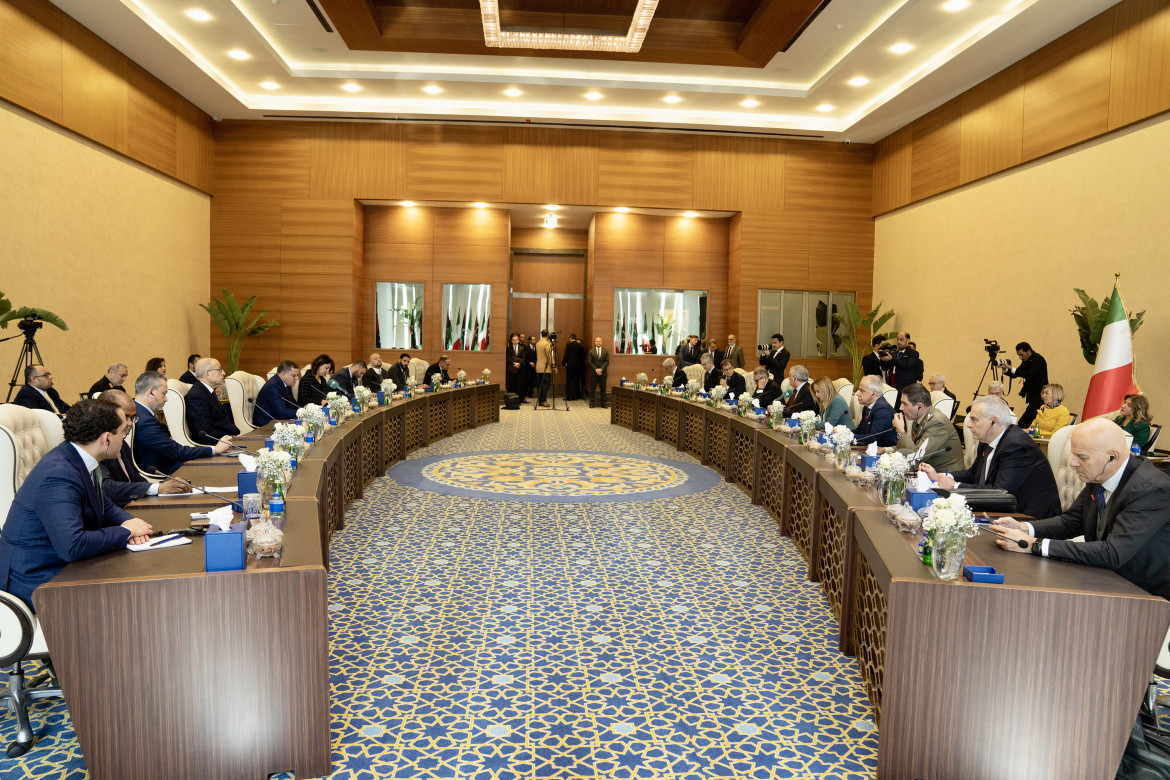Commentary
Meloni will use Libya as a gas station, bought with refugees’ lives
Italy, via ENI, will invest €8 billion into Libyan offshore gas to be transported through the Greenstream pipeline, and in return the Libyans have pledged to keep the flow of migrants under control.

Here’s a stark summary of the substance of Prime Minister Meloni’s trip to Tripoli in Libya: gas in exchange for refugees.
Italy, via ENI, will invest €8 billion into Libyan offshore gas to be transported through the Greenstream pipeline between Mellitàh and Gela (which has been active on and off since 2004), and in return, the Libyans have pledged, in the vaguest of terms, to keep the flow of migrants under control, whom the smugglers themselves are locking up in what we know are desperate and miserable places resembling prisons and concentration camps.
If all this “helps the Africans grow,” as Meloni stated, then we’re doing a hell of a job. The truth is that we see Libya as nothing more than a gas station. Not least because the premier herself made a slip when she said she wanted to “strengthen” the Libyan Coast Guard, following in the colonial footsteps of former “Democratic” Minister Minniti. Authoritative U.N. and European human rights institutions (together with Human Right Watch and Amnesty International) have repeatedly confirmed what is visible to all: that crimes against humanity are being committed in Libya, and support for the so-called “Coast Guard” is actually support for tribal militias responsible for human trafficking, violence and rape, as well as guilty of fueling internal conflict, making reconciliation and any prospect for a credible electoral process ever more unlikely (elections scheduled for 2021 have been postponed indefinitely).
Libya remains a merciless litmus test for our mistakes. As was already the case at the time of Gaddafi’s agreements with Italy in August 2010, six months before we bombed him together with the U.S., Britain, France and NATO: the raìs was received in Rome with pomp and circumstance, with parades of horses and camels at Tor di Quinto and the outstretched hands of politicians and businessmen, all offered to the dictator on a silver platter in exchange for promises of €55 billion in business (not the meager €8 billion in gas negotiated now). It’s clear that our price, and also that of our interlocutors on the south shore of the Mediterranean, has seen some steep cuts over the years.
Even more: in 2011, we didn’t even have the courage to take a more appropriate position of neutrality in the Libyan conflict, as Germany did. In short, the country that the socialist historian Gaetano Salvemini called “a sandbox” back in 1911 – with a dose of healthy but underappreciated anti-colonialism – and which turned into a scene of tragedy in the 1930s with the massacre of 80,000 Libyans (out of a population of 800,000) carried out by the Fascists and General Graziani, has become a sad Russian doll of our mistakes, which have built up one after another, from one century to another, from one government to another.
The premier’s trip to Libya follows the one she just made to Algeria, Moscow’s historic ally, in a tour of North Africa in which Italy is trying to cash in on the last scraps of its credibility, based in recent decades more on the constant presence of ENI (which supplies Libya with 80 percent of its electricity) than on the start-and-stop policies of our governments – which, moreover, are constantly being sabotaged, under the watchful eye of the U.S., by our allies in Paris and London. “We must avoid the risk that some influences might work to destabilize the situation rather than improve it,” stressed Meloni, whose main goal is “to stop the refugees” and to avoid falling in new traps, both Libyan and European – with doubtful success.
Libyan premier Abdelhamid Dbeibah was strutting around confidently on Monday at the military parade, but he is a vulnerable character, as was his predecessor Sarraj – head of the only government recognized by the international community – who in November 2019 asked Italy for help in repelling Libyan General Haftar. Instead of us, it was Erdogan, the NATO Sultan, who intervened with drones, and, as if to mock us, put his soldiers on the patrol boats we gave to the Libyans.
On the other side of the Libyan conflict, in Cyrenaica, lined up behind Haftar are the Russian mercenaries of Wagner, the British, the UAE, the French, who are playing a double game, and Egypt led by General-President Al-Sisi. The Egyptian general, with his gas, is also part of Prime Minister Meloni’s “Mattei Plan,” a project to turn Italy into an energy hub: all we have to do is accept Al-Sisi’s wretched lies – which nobody even pretends to believe except for Foreign Minister Tajani – that he actually wants to “cooperate” on the truth for Giulio Regeni. The indictment papers against the policemen and intelligence agents who tortured and killed Giulio are there at the Rome Prosecutor’s office, clear as day, but no notifications of the proceedings have been delivered by Cairo to the defendants. And they might never be.
Not a word was said in Tripoli about the fact that more than 11 years after the killing of Gaddafi, Libya has never signed the 1951 Geneva Refugee Convention, the only legal instrument that would allow U.N. agencies to enter to provide migrants with more humane assistance. Today, anyone entering Libya without a visa is considered an illegal immigrant, bereft of any humanitarian or political protection. Libya is de facto outside the international community, but this is not talked about in Italy, or in Europe more generally. A quick city break of a few hours in Tripoli or Algiers does not a Mediterranean policy make.
Originally published at https://ilmanifesto.it/piano-mattei-la-libia-come-pompa-di-benzina on 2023-01-29
